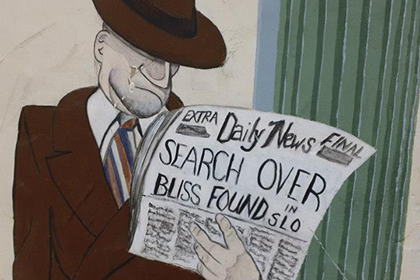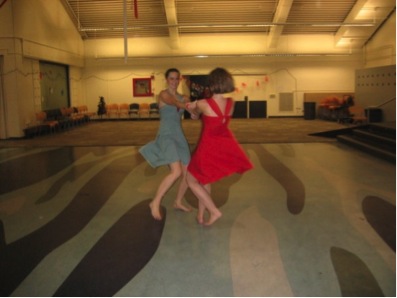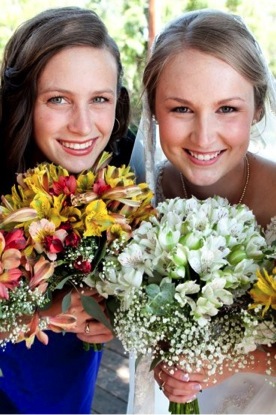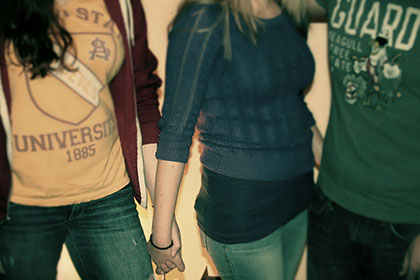When I was five years old I became obsessed with figure skating. Not just mesmerized or fascinated, but outright obsessed. I watched it every chance I got on television and imagined throwing myself into the air to spin like the skaters I idolized. I even used my slippers to glide across the kitchen floor, pretending I was skating on ice.
My parents were pretty entertained by this and when my obsession didn’t go away after a few weeks, they enrolled me in skating classes at the local ice rink. I’m pretty sure they thought I’d get bored with it and move on after a few sessions. But instead I turned out to be an avid skater, rarely ever falling, and skipping right past the tots intro class that required you to wear a helmet and skate with an orange safety cone.
For the next few years I skated every winter (it was a seasonal rink) and did fairly well, that is until I hit the moves that required me to have a fair amount of (read: any) coordination.
I skated on and off until I was twelve, when a not-so-great injury made me realize that I was not built to throw myself into the air and never would be. I moved on to other interests but I still hold a love for the sport that captured my attention when I was little.
So to help those who are new to this wonderful sport (yes, it’s a sport, don’t you dare argue with me), here are a few keys elements you’ll be looking at when watching the skating unfold.
1) Jumps
Ah, yes, throwing yourself blindly into the air and then landing on a thin piece of metal on a slippery surface. No big deal, right? There are six types of jumps – the toe loop, the Lutz, the flip, the Salchow the loop, and the Axel – often in double and triple form (if not quads, which is INSANE) because that’s how many rotations they have to get through in the air before landing. To get an idea of what these look like and for more detail on what each of them are, check out this awesome article from The Wire with gifs of each of them. They then have to land on the appropriate edge of their skate (inside or outside, depending on which way they’re going) and they better not even dare to land on two feet or man are they screwed in points.
2) Spins
There are a six core spins you will see and hear about in the Olympics, all of which require so much speed that many of the skaters become blurs before your eyes – the scratch, the flying, the sit, the Biellmann, the layback (my favorite), and the camel. Check out this handy guide, with GIFs, that compliments The Wire’s article. All of these require a solid center, much flexibility, and an enormous amount of power and core strength to keep the speed up. These spins often have variations as well – like switching feet, picking up speed mid-spin, and even occasionally combining spins – in order to get more points for difficulty. On top of it, they are seen as more artistic than jumps, and therefore must be graceful in order to also be seen as effective. It’s no easy task.
3) All those other random moves they do
A lot of other moves are seen more for artistic movement. Some don’t have official names, and most of that is dance-like stuff, but there are a few I can quickly introduce you to.
Spiral – nonsensically, this is the move where the skater puts her leg high into the air behind her (or sometimes in front of her if she’s a pretzel) and glides. It’s actually a lot easier than it looks (didn’t think I’d say that, eh?) but requires massive amounts of flexibility and balance.
Lunge – this is exactly as it sounds. The skater puts his leg down onto the ice and drags it behind him, usually for just a second or two because it will slow him down. This requires a strong center of gravity, let me tell you, or you’ll end up in the most uncomfortable half-split of your life. I may or may not be speaking from experience.
Crossovers – oh, these things suck. These things are what did me in early in my years of lessons because I was so clumsy. The concept is that you cross one foot over the other, either forwards or backwards, and it helps you gain speed—plus it looks nice. They do these constantly while skating. Look for them next time you watch and you won’t be able to un-see them again.
There you go – your basics to the language of figure skating. If you’re still hungry for more terminology, check out the United States Figure Skating Association’s glossary of terms – it’s comprehensive and very useful. Now go pop some popcorn and settle into your couch while you watch these skaters fling themselves into the air, spin at high speeds and generally do things that seem unsafe for the population at large. And then watch them cry as they get their scores. It’s the next great American pastime – only with ice, blades, and absolutely no padding, because padding is for amateurs.
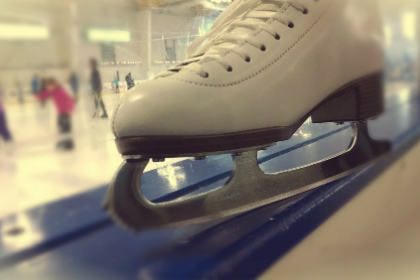
Photo by Sara Slattery
